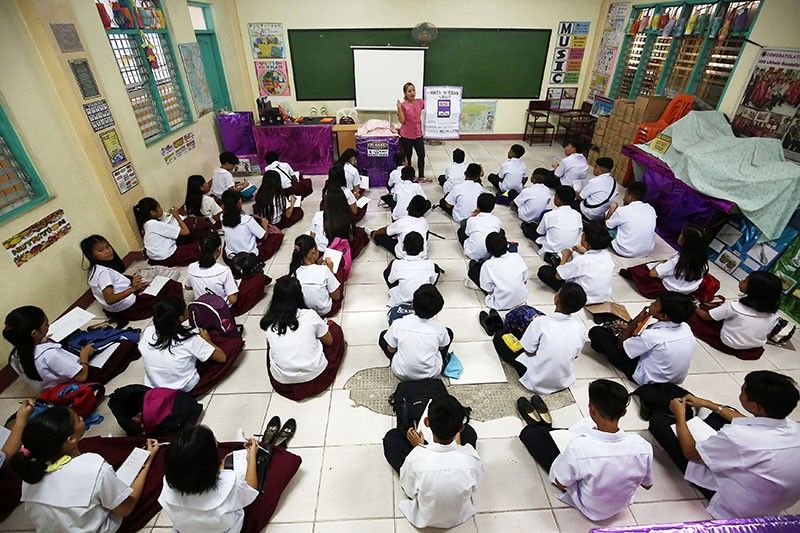DepEd: Special education funds were 'excluded' from budget 'despite earnest efforts'

MANILA, Philippines (Updated 11:12 a.m.) — The Department of Education defended Monday it's zero peso budget allocation for special education programs to educate learners with disability under the proposed national budget, saying the matter was out of its hands.
In a statement issued Monday morning, DepEd pushed back against what it said were "malicious and misleading" reports that its leadership deliberately excluded funding for the Special Education Program.
"Despite our earnest efforts to advocate for our learners with special needs, it was not considered in the National Expenditure Program. This is true for two other programs that were excluded from the NEP," the department said.
The NEP is the budget draft the executive branch submits to Congress, which eventually becomes the basis for the proposed national budget before it becomes the General Appropriations Act.
The DepEd statement did not mention what were the other two programs left out of the NEP.
"This is a recurring circumstance every year, and DepEd is not at a loss because we always work with members of Congress to find other ways to fund DepEd programs. In the past years, DepEd has likewise made efforts within the organization to ensure that programs are supported."
Budget hearing
Per earlier DepEd figures, the enrollment of students with disabilities stood at 93,895 for the school year 2021-2022, lower by 74% compared to its pre-pandemic figure of 360,879.
Under the government's budgeting process for the NEP, the Development Budget Coordination Committee led by the Department of Budget and Management determines the overall economic targets, expenditure levels, the revenue projection, deficit levels and the financing plan.
However, as a briefer on the website of the Office of the Ombudsman points out: "Agencies undertake their own internal consultations. They rank programs, projects and activities using the capital budgeting approach. Then they submit their budget estimates, taking into account their own priorities and those of the national government under the Medium-term Public Investment Program."
To recall, the department admitted before the House appropriations panel that special children’s education efforts did not have dedicated funds under its 2023 NEP allocation.
“We requested P560 million for 2023, but it’s zero budget,” Education Undersecretary Ernesto Gaviola told the Committee. "We are just utilizing whatever is available funds for 2022.”
“The special children are those who need special attention and special necessities compared to other children,” Rep. Edcel Lagman (Albay 1st District) said in response. “That is very important because I understand we have an increasing number of special children in the Philippines."
Just last March, former president Rodrigo Duterte signed Republic Act 11650 that guarantees free early and basic education to learners with special needs.
Under the measure, special education students and learners with disability are given better access to the formal school system through the creation of Inclusive Learning Resource Centers in every city and municipality.
The law calls for a "whole-of-community approach" for introducing learners with disabilities into the general education system and community, adding that all sectors including the academe and private stakeholders must participate in such efforts.
Confidential funds have 'legal basis'
In its second statement released later Monday, the DepEd was also careful to argue that its controversial "confidential funds" worth P150 million had legal basis under a DBM joint circular.
The Aquino-administration DBM Joint Circular 2015-01 outlines guidelines on the release, use, reporting and audit of confidential or intelligence funds. It says that confidential funds may only be used for, among other things, "uncovering and preventing illegal activities that pose a clear and present danger to agency personnel or property, or other facilities and resources under the agency's protection, done in coordination with the appropriate law enforcement agencies."
"The threats to the learning environment, safety, and security of DepEd personnel are interlocking with the mandate of support to the national security of civilian offices," the statement read.
The department went on to claim that it faces "not only...problems with access, equity and quality education but also [other] pressing issues on safety and security."
At the same briefing before the House committee on appropriations, Vice President Sara Duterte, concurrently education secretary, claimed that her department was also besieged by concerns of sexual grooming of students, youth recruitment to terrorism and violent extremism, and drug use by government personnel.
“That is why we need the help of the security cluster and the security sector to address these issues and challenges to basic education. And as I said, basic education has a direct link to our country’s national security,” she said then.
"By their nature of being unlawful, [these issues] need the support of surveillance and intelligence gathering to ensure that the projects of DepEd are target-specific and will result in the broader protection of our personnel and learners," the DepEd also said.
It is yet unclear how the funds can be used to combat these issues, and Duterte has not disclosed if the DepEd is coordinating with law enforcement personnel to arrest any illegal activities that pose a clear and present danger as outlined in the DBM joint circular from 2015.
Rep. Raoul Manuel (Kabataan Party-list) responded by pointing to the history of red-tagging of teachers and students in educational institutions over the coronavirus pandemic.
The progressive Makabayan bloc, where Manuel belongs to, earlier pointed out that only one of the 116 state colleges and universities will not be slapped with a budget cut next year in the proposed NEP. This, while the total confidential and intelligence funds inserted in the NEP amounts to P9.28 billion.
"The budget cuts will force schools to pursue commercialization policies and the imposition of additional fees to sustain funds, which will bar students from enrolling due to financial barriers, hence depriving the youth of safe, quality, and accessible education," Makabayan said in a statement sent to reporters.
- Latest
- Trending































